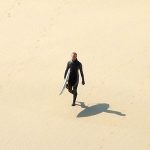Surfing U.S.A (Rincon to be precise)
Image source: L Paul Mann
SoCal hosts some of the top surfing destinations, surf brands and surfboard companies in the world. Combined with incredible surf culture, waves and sunshine, it’s a rite of passage for any surfer worth their salt.
There’s a lot of surf breaks you’ll want to hit along the 4 hour drive from Santa Barbara down to San Diego. From the world famous Rincon point break down to the barreling Blacks Beach, there’s a wave for all abilities.
Here’s seven essential surf stops to get you started:
Rincon Point
Rincon Beach on a small day
Image source: Roman Königshofer
Although it doesn’t happen often, when the sections join up you have one helluva long ride. The sight will stop you in your tracks as you head along Hwy 101.
It’s the perfect place to hangout and listen to Beach Boys Surfin’ Safari, where the surf spot gets a mention.
Rincon is 24th in the book of 100 Best Surf Spots in the world. Once you’ve experienced a classic ride at Rincon, you’ll instantly understand why.
To get here: Take the Bates Road exit off Highway 101.
Malibu
Malibu between sets
Image source: Public Domian Pictures
Today, thanks to a revival in longboarding and its close proximity to Los Angeles, Malibu is always busy. Don’t let that put you off though, as with every popular wave if you go with the right attitude you’ll be rewarded with some top quality waves and some memorable moments.
There are three main sections: first, second and third point. First point near the pier is your best bet, with consistent waves that work at all tides. If the crowds get too intense, try nearby Zuma Beach for a family-friendly 3 mile long beach that should offer more breathing space.
To get here: turn off the CA-1 onto Webb Way, then turn left onto Malibu Rd and left again onto Malibu Colony Rd up to the point.
Huntington Beach Pier
Surf City
Image source: Good Free Photos
North of the pier works well on winter swells, the south side works best on SW swells when you can attempt to ‘shoot the pier’ on left handers. Both sides work well at all stages of tide.
Huntington has a rich history from surfing legends like Corky Carroll and Herbie Fletcher, to the infamous U.S. Open contest. Whilst this spot divides opinion over wave quality, its well earned place in surfing culture makes this an essential spot for your hit list.
To get here: head along the Pacific Highway until you see the pier, then pick a parking spot.
Trestles Beach
Trestles are the sacred sands of SoCal surfing. The two main sections Upper and Lower Trestles, mop up swells from all directions, they work at all tides, handle most winds and entertain huge crowds. If you can’t decide between Upper and Lower, try Middles.
Lower Trestles has been a regular host of the WSL’s Pro tour and the USA Surfing Championships, and you’d be forgiven for thinking that many of the pro athletes live here. The standard of surfing is insanely good, which means the chance of you getting a good wave is frustratingly low.
However, this is a legendary surf spot with consistent, high-quality waves. So grab a board, give it a go and tick it off your to-do list. Then sit back and enjoy the show.
To get here: Take the Cristianitos exit off the I-5, park in the State Beach Parking area and follow the beach trail.
San Onofre State Beach
San Onofre sunset
Image source: Justin Meissen
San Onofre State Beach is also known as Surfing Beach, San O or Old Man’s. It’s on the north side of an old nuclear plant, and you’ll see the distinctive domes from the freeway.
As the name suggests, this is a forgiving surfing beach particularly suited to learners and older surfers who like a laid-back wave.
To get here: Take is through the Old Pacific Highway from San Clemente.
Black’s Beach San Diego
Black’s Beach
Image source: WikiMedia
Be warned, Black’s Beach is not for the faint hearted. Whilst surrounded by golden sands and majestic cliffs, it takes a mini-trek to get here. Once you’ve caught your breath, the paddle out on a heavy swell is merciless. If you make it outback, the crowds are intense, thanks to the nearby UCSD.
However, catch it right and this is a beautiful and unforgettable wave that’s well worth the effort. Final word of warning, be careful where you wander, as a large section of the beach is designated for nudists.
To get here: if you take the gated road off La Jolla Farms Road, you’ll end up at the South Peak and can avoid the nudists should you wish.
La Jolla Shores Beach
La Jolla Shores
Image source: Leandro Neumann Ciuffo
In the summer, it’s a popular spot with beginners as the waves are often slow and easy going. But on a good winter swell, it’ll offer up some serious beach-break barrels.
To get the most from La Jolla Shores go off-season, go early and respect the locals.
To get here: Head north from downtown La Jolla to Torrey Pines Road. Turn left onto Calle Frescota that leads to the lot entrance.
There are of course many other famous surf spots along the south coast of California e.g. Newport Wedge, Laguna Beach, Windansea, which I hope you get to visit. Don’t forget, five minutes drive either side of the well known beaches are often hidden gems. So don’t be afraid to explore.
